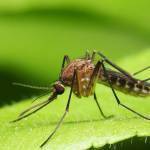Disease Report: Japanese Encephalitis in Horses

Australian horse owners should be vigilant for signs of illness, especially neurological deficits, in their horses, as Japanese encephalitis virus has been detected in several states, according to a press release from the Office of the Australian Chief Veterinarian Officer.
Although the virus was initially identified in commercial piggeries, horses and humans can become infected. Unfortunately, the first human death due to the virus occurred in early March. At this time, it is not known how the virus landed in southern Australia, as the virus was previously only detected in the far north of Australia, but it has widespread distribution throughout southeast and northeast Asia.
Japanese encephalitis virus is transmitted by mosquitoes, and is maintained in a transmission cycle that includes certain waterbirds, namely herons and egrets, and pigs. Waterbirds and pigs are both considered reservoir and amplifying hosts for the virus, meaning the virus replicates efficiently in these species and spreads to other mosquitos. While horses and other species may become infected with the Japanese encephalitis virus, their viral load is insufficient to infect mosquitoes. Horses are therefore considered dead-end hosts, so the virus cannot spread from horses to humans.
In horses, many cases are asymptomatic, and those with mild clinical disease show signs of fever, lethargy, congested or jaundiced mucosal membranes, and inappetence. In addition to those signs, more severe cases may display neurological deficits, such as incoordination, difficulty swallowing, neck rigidity, and vision impairment. In these instances, recovery typically transpires uneventfully, and horses survive.
Occasionally, in the most severe cases, hyperexcitable behavior occurs, often coupled with blindness, profuse sweating, teeth-grinding, and spasmodic muscle twitching. As these clinical signs dissipate, collapse and death are common one to two days later.
Contact a veterinarian immediately if your horse, pony, or donkey shows any sign of illness. Japanese encephalitis virus is a notifiable exotic disease in Australia, so the local Department of Agriculture should also be contacted. Treatment is primarily supportive. Nonsteroidal anti-inflammatory drugs are often given to relieve fever, inflammation, and discomfort. Other supportive care, such as fluid therapy, is sometimes warranted. High doses of natural-source vitamin E are often recommended by veterinarians for antioxidant support in cases of neurological disease. Choose a highly bioavailable vitamin E supplement such as Nano-E.
Important considerations for preventing spread of the disease to your horses:
- Clean up potential mosquito breeding sites whenever possible, modifying the landscape to keep standing water at a minimum. Further, aerial insecticide use may be necessary when considering large expanses of land, but application should adhere to any government restrictions.
- Reduce mosquito exposure overnight through the use of stable screens; consistent application of appropriate topical insecticides; and use of lightweight, breathable sheets.
- House horses when mosquitoes are most likely to feed, between dusk and dawn. The specific mosquitoes that transmit the disease in Australia are hesitant to enter stables and other buildings.
- Consider separating pigs and horses as much as possible when they must share a property.
A vaccine protects against clinical disease and possible aftereffects of the disease, such as residual incoordination and urinary incontinence. While horses have been successfully vaccinated for more than 50 years in other regions of the world, this vaccine is not currently available in Australia. A vaccine for humans at high risk of contracting Japanese encephalitis is available.
Ellis, P.M., P.W. Daniels, D.J. Banks. 2000. Japanese encephalitis. Veterinary Clinics of North America: Equine Practice 16:565-578.
Erlanger, T.E., S. Weiss, J. Keiser, J. Utzinger, and K. Wiedenmayer. 2009. Past, present, and future of Japanese encephalitis. Emerging Infectious Diseases 15(1):1-7.








